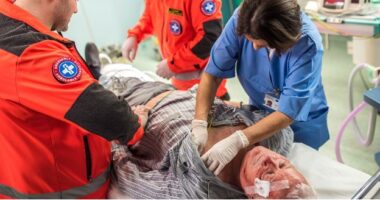 Standardized patients (SPs), who are individuals trained to simulate real patients with a level of consistency, have emerged as a pivotal element in augmenting the skills of healthcare professionals. Hospital administrators and leaders who are enthusiastic about embracing innovation should consider the myriad benefits that SPs, especially those based remotely, can offer their organizations.
Standardized patients (SPs), who are individuals trained to simulate real patients with a level of consistency, have emerged as a pivotal element in augmenting the skills of healthcare professionals. Hospital administrators and leaders who are enthusiastic about embracing innovation should consider the myriad benefits that SPs, especially those based remotely, can offer their organizations.
Training and Education
Standardized patients can be instrumental in achieving performance metrics. For example, with SPs trained to simulate various trauma scenarios, emergency medicine physicians can engage in the realistic practice of clinical decision-making and emergency responses in a controlled environment. This hands-on approach is vital for fine-tuning skills essential in high-pressure situations.
Also, for health systems that emphasize interdisciplinary collaboration, SPs provide an opportunity for realistic training in team-based scenarios. Through such simulated cases, healthcare teams can practice communication and coordination, which are vital in ensuring comprehensive patient care.
Error Identification and Prevention
SP training can also contribute to improving patient safety. When SPs simulate scenarios focusing on infection control, for instance, administrators can detect lapses in the protocol, ensuring adherence to patient safety standards.
On a systemic level, SPs in multidisciplinary scenarios can highlight inefficiencies in communication or patient handoff processes. This knowledge allows leadership to proactively implement corrective measures, potentially improving patient outcomes and reducing hospital readmissions.
Benefits of Remote-based SPs
Remote-based SPs offer additional, practical benefits that health system administrators might find compelling. Cost-saving is at the forefront, as remote-based SPs eliminate expenses related to travel and physical resources. Additionally, remote-based SPs offer unparalleled accessibility. This is particularly advantageous for health systems with rural facilities or when in-person interactions are limited. Administrators safeguard the quality of care provided across their network by ensuring continuity in training and assessment through remote engagements.
With the growing adoption of telemedicine, remote-based SPs are indispensable for training healthcare professionals in virtual consultations, providing the opportunity for an organization to offer more extensive services and reach a broader patient base.
Furthermore, remote-based SPs can simulate diverse patient scenarios, including rare cases that would not typically be encountered in a healthcare professional’s local area. For health system leaders, this means preparing their healthcare professionals for an extensive range of clinical situations, which is directly related to the competency and versatility of the care provided.
In conclusion, many health systems have found that standardized patients are essential in maintaining excellence in patient care. Remote-based SPs, in particular, unlock many possibilities, including cost savings, enhanced accessibility, and diverse training.
Elevate your healthcare training with SP-ed’s remote Standardized Patient services. Experience real-time standardized patient interactions and enhance critical skills for in-office and telehealth visits. SP-ed’s award-winning platform fosters engagement, measurement, and personalized care. Ready to redefine professional development and deliver superior patient care? Contact Simclusive today to learn more.

